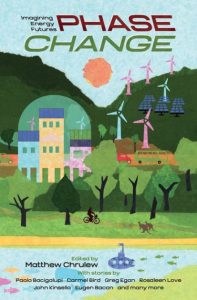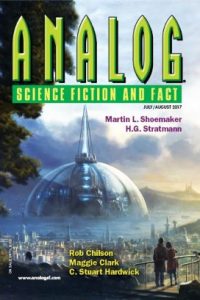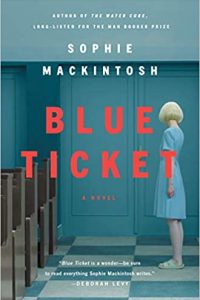Alexandra Pierce Reviews Phase Change: Imagining Energy Futures by Matthew Chrulew, ed.
 Phase Change: Imagining Energy Futures, Matthew Chrulew, ed. (Twelfth Planet Press 978-1-92210-173-0, $29.99, 447pp, pb) March 2022. Cover by Cathy Larsen.
Phase Change: Imagining Energy Futures, Matthew Chrulew, ed. (Twelfth Planet Press 978-1-92210-173-0, $29.99, 447pp, pb) March 2022. Cover by Cathy Larsen.
“Cli-fi” – climate fiction – seems to be a hip new trend; or at least, a new(ish) name for a type of fiction that has existed for a long time and finally seems to be getting more interest. Phase Change doesn’t quite fit into that mold, for all that it’s predicated on the reality of climate change and the need for humans to alter the way we live. Instead, the premise is that an important part of that alteration is in the way humans relate to energy resources: where that energy comes from, and how it’s used.
The editor, Matthew Chrulew, notes that energy use is about both physics and chemistry on the one hand, but is also connected to history, value, power in its political sense, and social connections on the other. As part of his introduction Chrulew situates science fiction as playing an important part in shaping the future – any future – and therefore our energy future. The book was funded as part of Curtin University’s Energaia: Imagining Energy Futures, so I wonder if there was an element of justifying its inclusion at play there. He also points out that even if we don’t ascribe “activist power” to art, “weaponised and impoverished narratives of the future already sculpt the earth, from corporate scenarios and forecasts to tech oligarchs’ extropian fantasies. This is not terrain we can afford to cede.”
The 22 stories in this anthology address the brief in various ways, and with varying degrees of success. They have little in common with one another aside from involving, in some way, a reflection on energy origins and usage – thus avoiding the pitfall of the themed anthology, that all stories start to bleed together. Stories range from planet-hopping in the far future to all-too-real near-future Australia; stories take place on the ocean, in Sweden or the USA, and in unnamed and unknown locations. Sometimes the stories feel only just that side of science fictional, while others take the reader on a wild ride to make a point.
My favorite stories cover a range of scenarios. First, Andrew Dana Hudson and Corey J. White together provide “Boomtown”, which you knowis set in Australia when a character says “G’day” (it’s a cliché, but sometimes those exist for a reason…). A complex set of economic and political machinations in the near-ish future have left a thriving community in the desert with a massive solar installation, initially thrown over by the corporates – and then told they have to give everything back, and you can probably guess how well that goes. Rather than being adversarial, though, this story is absolutely about the power of communities to do important, game-changing work around power in all its definitions. Then there’s Paul Graham Raven’s “Facing Kiruna”, which purports to be an extract from a biography of Lieđđi, scheduled for publication in 2073. Such a conceit can sometimes be twee or boring, but Raven does an excellent job of being earnest – mentioning sources, ethical considerations in writing a biography – while also genuinely telling a story. The narrative focuses on a researcher, Claes Magnusson, grappling with what it means to be a “person.” The connection to the idea of energy comes with the idea of places being recognized as having “personhood,” like the New Zealand river, the Whanganui, and the attempt to give Lake Erie rights; and then how such places – persons – are affected by mining and other such human efforts. It’s a powerful story on many levels. Finally, another near-future-in-Australia story appealed particularly to the teacher in me: Thoraiya Dyer’s “Checkerboard”. Teachers, students and associated adults share the storytelling across a couple of generations in and around a Sydney that is becoming unliveable thanks to climate change. The teaching has been largely online for years, thanks to ongoing pandemics (an idea that absolutely gave me the shudders), and 4:00 a.m. is a fine time to call someone as people adjust to the extreme heat. The connection to the idea of energy may appear tangential, but it’s fundamental to the way the story develops; and it’s a beautiful piece of fiction.
Not every story in this anthology is hopeful. Few suggest a solution to the very real problems facing us. But they do offer alternatives to “corporate scenarios and forecasts to tech oligarchs’ extropian fantasies,” and they suggest that science fiction can and should be part of the way we dream the future.
Reviewer’s note: I am a judge for the 2022 Aurealis Awards. This review is my personal opinion and does not reflect the opinion of any judging panel, the judging coordinators, or the Aurealis Awards management team.
Alexandra Pierce reads, writes, podcasts, cooks and knits; she’s Australian and a feminist. She was a host of the Hugo Award winning podcast Galactic Suburbia for a decade; her new podcast is all about indie bookshops and is called Paper Defiance. Alex has edited two award-winning non-fiction anthologies, Letters to Tiptree and Luminscent Threads: Connections to Octavia E Butler. She reviews a wide range of books at www.randomalex.net.
This review and more like it in the December 2022 issue of Locus.
 While you are here, please take a moment to support Locus with a one-time or recurring donation. We rely on reader donations to keep the magazine and site going, and would like to keep the site paywall free, but WE NEED YOUR FINANCIAL SUPPORT to continue quality coverage of the science fiction and fantasy field.
While you are here, please take a moment to support Locus with a one-time or recurring donation. We rely on reader donations to keep the magazine and site going, and would like to keep the site paywall free, but WE NEED YOUR FINANCIAL SUPPORT to continue quality coverage of the science fiction and fantasy field.
©Locus Magazine. Copyrighted material may not be republished without permission of LSFF.







